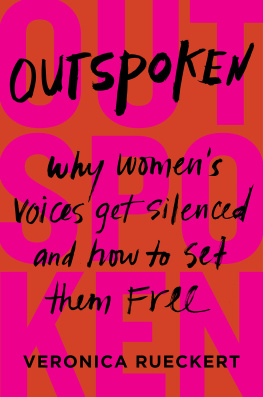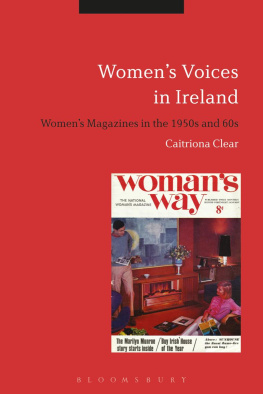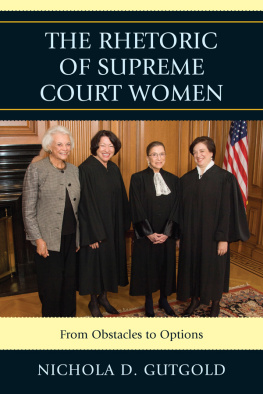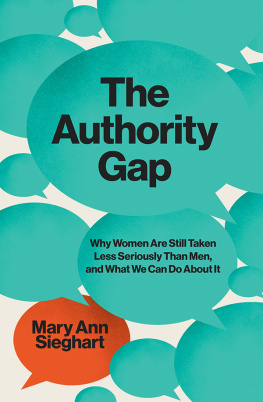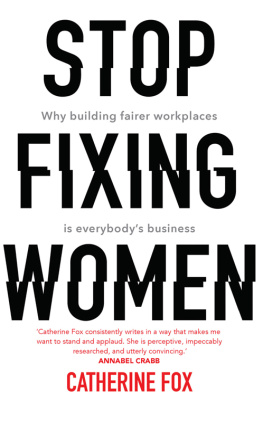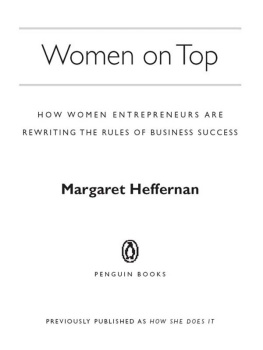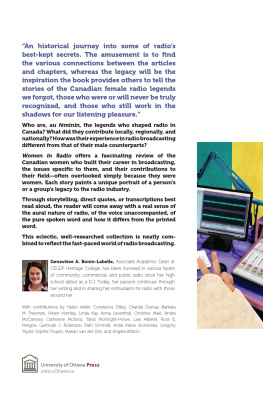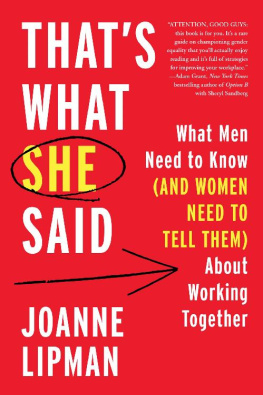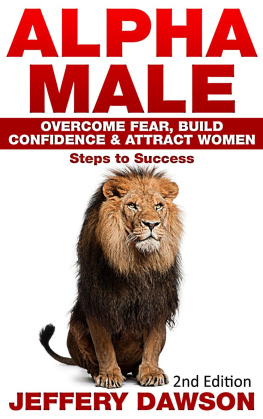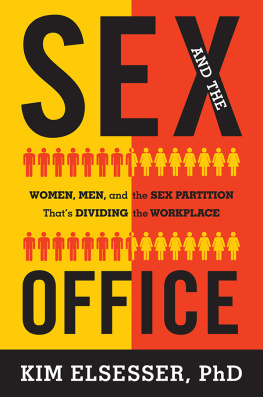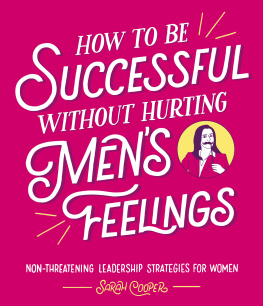Contents
This book is for my mother, and the rest of my equally beautiful, funny, outspoken familyB., B., W., G.
No advanced step taken by women has been so bitterly contested as that of speaking in public. For nothing which they have attempted, not even to secure the suffrage, have they been so abused, condemned and antagonized.
Susan B. Anthony, Fifty Years of Work for Woman (February 15, 1900)
I was a teenager when I first watched Disneys version of The Little Mermaid. Two hours later I was as much a fool for Ariel as anybody else. I knew the Hans Christian Andersen story it was based upon, having come across it as a little girlbefore I knew enough of the world to be bothered by the fact that Andersens mermaid suffered stabs like steak knives when she walked on land and that when she wasnt singing with her remarkably lovely voice, she was notably silent. Disneys Ariel was so much more appealing. She cavorted with dolphins, rumbled with sharks, and had a calypso-singing crab as a sidekick. Apart from all that, we had something in common: we both loved to use our voices.
Id long since memorized each one of Ariels songs by the time I became a mother and had matured enough to abandon my teenage obsession with Ariels perfect, bouncy red bangs. It hadnt occurred to my younger self that my hair never looked as good as Ariels, because she was a cartoon character.
It wasnt until I watched the movie with my son that I realized what was troubling me. It was subtle at first. When Ariel surrendered her voice in its entirety to the Sea Witch, I felt the first stirrings. Swapping her voice in exchange for human legs on a fools quest to win Prince Eric seemed like a patently bad idea. After all, her voice was most of what he knew of her. It was her lovely singing voice the prince first heard as Ariel rescued him from that shipwreck. Without it, how could she convey to him all the things that she was? The daughter of a sea king, a collector, a defier of sharks?
Even Andersens original little mermaid had a moment of doubt. But if you take away my voice, what is left for me? she asks the Sea Witch. It was the right question to ask and remains so today.
Youll have your looks, Disneys Sea Witch assures Ariel. Your pretty face. And dont underestimate the importance of body language.
In other words, what girl needs a voice when she has a body? Of course, the Sea Witch may have known all along that Ariels sense of self was wrapped up in her voice. Ariel doesnt totally succeed with Prince Eric until she has her voice back, but she comes awfully close to getting that kiss. Her looks, her pretty face, were almost enough to get the job done.
But something more fundamental was bothering me about The Little Mermaid: Ariel chose to give up her voice.
Ive built my career around my voice. After studying to be an opera singer in college, I graduated with a degree in vocal performance and found my way to Wisconsin Public Radio. There I shook hands with my tour guide, the stations velvet-voiced chief announcer, who showed me the music library, the studios, the stations full-size grand piano sprawled enticingly upon dated parquet floors. At the end of our tour, he looked into my eyes and changed my life. You dont have any speech defects, he said. Do you want to be on the air?
I didnt, actually. I was only hoping to find a job where I could get paid to write. But when someone asks you if you want to be on the radio, you say yes. And Im forever grateful that I did. Eventually I became a senior producer and contributor on the nationally syndicated program To the Best of Our Knowledge. The team and I hold a Peabody Award for our work on the show in 2004. Later I hosted my own program, The Veronica Rueckert Show; cofounded and cohosted the radio news magazine Central Time; and began a public-speaking and story-coaching company built to empower women to learn to use their voices as instruments of strength and personal expression. Over the years on the radio, I had the opportunity to talk with creators, performers, and thinkers who ran the gamut from feminist Gloria Steinem to former secretary of state Madeleine Albright. For all of these conversationsand every other one besidesI have needed a voice.
The human voice is a marvel. In a world with billions of people, your voice is unique. Its shaped by the way your parents spoke, by where you live, by how your body is formed, and by the resonance spaces in your head, neck, and chest. Its shaped by how you feel about yourself. Your voice is a unique fingerprint of who you are and a truer image of the self than almost any other part of your physical being.
I love nothing so well as the sound of the human voice. I have trouble with names, but I imprint voices and carry them with me forever: the lush four-part harmonies of the band Great Big Sea, sung to a crowd in the tiny black-box bar where I first saw them; the bubbling warmth of Anna Pavord enthusing about the flower that drove seventeenth-century Western Europe into a frenzy. She is the reason I fill my house with tulips. My music school classmate Nate Stampley rehearsing Ralph Vaughan Williamss bittersweet Songs of Travelthe first time I ever heard themin an empty concert hall; the bottomless love in the voice of Sister Priya; and the unselfconscious sound of my kids belting out Hamilton in the back seat of my car. These are the voices I carry with me. The music of them is stamped on my soul. I love my own voice, too.
Most of the time when I ask the women in my workshops or the audiences at my talks if they love their own voices, the answer is no. A stray person or two might think her voice is a little okay, but most of them flat out dont even like it. Heres whats so sad about that: without a positive relationship with such a key part of ourselves, its challenging to share whats insidethe ideas, the love, the passion, and, most of all, the potential.
The way we feel about ourselves is inextricably linked with our voice. The vocal instrument is housed in the body, so that makes any ambivalence we have about our physical selves part of the relationship we have with our voice.
I worked with one woman who, as a child, had been choked by a neighborhood boy. He had clamped his hands around her neck, and when she had tried to scream for help, she couldnt. To this day, she has nightmares about not being able to speak and has a complicated relationship with her voice. She says that if she can get away with it, shed rather be silent than talk. To be clear, theres nothing wrong with being an introvert or desiring silence, but she came to me to find a new pathway toward a positive relationship with her voice. Another woman I worked with, an attorney, had just been made partner but didnt feel she had reached her leadership potential. As part of her exploration of how to express herself more fully, she worked with me to strengthen her voice, take a stronger stance at meetings, and bring the full dynamic range of her voice into play when she spoke. For her, the voice was a conduit for self-expression and leadership.
The voice is an amazing gift, both a privilege and a responsibility. Using it takes courage, especially if youre a woman. Were given only a finite amount of time to figure out what its for, to grow into ourselves enough that we can speak up when the time comes.
Yet a womans right to speak in public is a right that hasnt been fully granted. Modern research backs this up. In a study of deliberative groups designed to mirror Congress in their gender makeup, women used only 60 percent of the floor time used by the average man.
In 2012, a Yale University study found that when hypothetical women executives talked more often than their peers, study respondents rated their competency down by 14 percent. But when male executives did the same, their competency rating went

